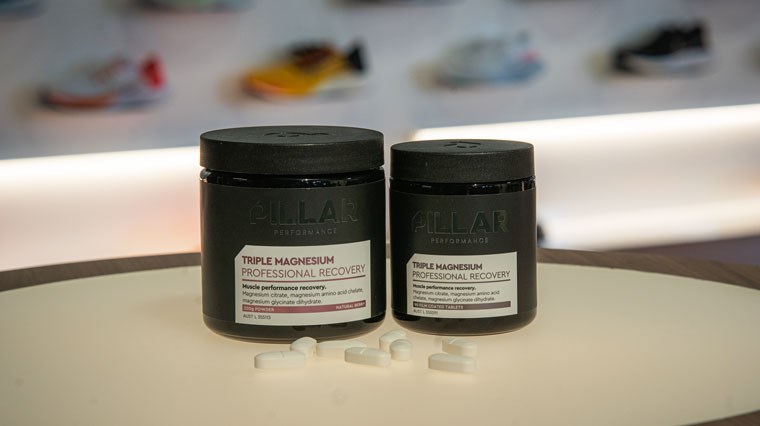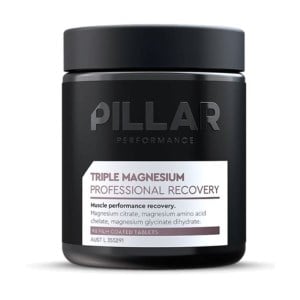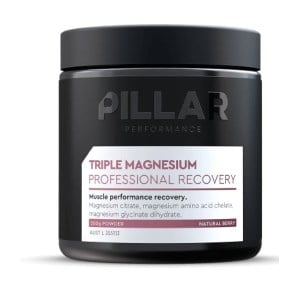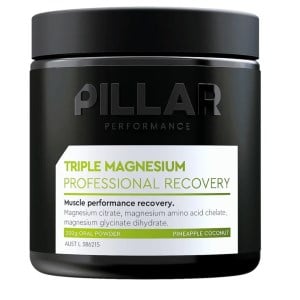Magnesium Is Good For Muscle Cramps, Sleep & Recovery. Here’s How To Get Enough.

If you suffer from muscle cramps, headaches and sleepless nights, low magnesium levels may be to blame. Known as the ‘relaxation’ mineral, magnesium naturally overlaps across all aspects of your recovery and performance including your muscle health, sleep quality and energy production.
A magnesium-rich diet can help you eat your way to better health but this can be challenging in practice, with an active lifestyle increasing your demand for this essential nutrient.
Whether in powder or tablet form, taking a high-quality magnesium supplement like Pillar Triple Magnesium Professional Recovery as part of your recovery plan has numerous benefits to your body.
Benefits Of Magnesium

Magnesium is a cofactor or ‘helper' molecule, involved in over 300 enzymatic reactions. It interacts with calcium, vitamin D and other micronutrients to support metabolic processes, playing a crucial role in everything from healthy muscle contractions, protein synthesis for muscle growth and repair, to energy production on a cellular level.
Magnesium Helps Maintain A Healthy Heart Rhythm
Although calcium is a crucial mineral, an overabundance of calcium in your body’s cells can be a problem or even overstimulate the heart. Magnesium acts as a natural ‘blocker’ to calcium to regulate your heartbeat. In simple terms, calcium aids in muscle contractions and magnesium aids in muscle relaxation.
Magnesium also contributes to your cardiovascular health in terms of reducing your risk of heart disease, helping lower blood pressure and prevent blood clotting.
Magnesium Improves Muscle Performance & Recovery
Magnesium is crucial to the healthy functioning of muscles and nerves – with a role in protein synthesis, muscle growth and regulating muscle contractions. Post-workout, magnesium naturally relieves tension to your fatigued muscles, preventing painful cramping and spasms as a vital part of your recovery plan.
Healthy magnesium levels can also prevent excess build-up of lactic acid responsible for muscle tightness and pain after high-intensity activity. Research suggests it may also slow muscle degradation as you age.
Magnesium Improves Bone Health
Alongside calcium, magnesium is crucial for maintaining bone mass. 60% of your body’s magnesium is found in the bones of your body and is vital for bone formation, increasing bone density, helping ward off osteoporosis and reducing risk of bone injuries such as fractures.
Magnesium has an integral part in the functioning of parathyroid hormone, or PTH which has a role in maintaining healthy calcium levels and regulating calcium absorption in the gut.
Magnesium is also essential in activating vitamin D sourced from UV rays to ensure the calcium you ingest is more effectively absorbed to support bone health and a strong skeletal system.
Magnesium Supports Sleep & Stress Management
There is a relationship between inadequate magnesium levels and poor sleep quality or insomnia. Stress can be a barrier to gaining quality sleep and it’s a vicious cycle, with troubled sleep or lack of sleep also contributing to higher stress levels.
Specifically, magnesium glycinate can help ease sleeplessness, supporting healthy levels of the neurotransmitter GABA (gamma-aminobutyric acid) that’s responsible for reducing stress, anxiety and calming a ‘busy’ mind to transition between wakefulness and a peaceful sleep.
It also supports the production of melatonin to help keep your circadian rhythm in sync with the natural day-night cycle, helping you feel refreshed and rejuvenated upon waking.
Magnesium Is Essential For Energy Production
Magnesium is essential to all life and every cell in your body. As a fundamental ‘ingredient’ of energy metabolism, it has a critical role in converting the nutrients you ingest into a usable source of energy.
It supports the mitochondria or ‘powerhouses’ of your cells to generate energy for biological processes. Adenosine triphosphate (ATP) – a molecule produced by mitochondria that’s responsible for storing and transferring energy within your cells and the ‘fuel’ for all cellular reactions – is only activated when bound to a magnesium ion.
Whether you’re wriggling your toes or competing in a triathlon, you can attribute that muscle movement in part to the role of magnesium in your energy production. This energy is also required in the repair of injuries and to support recovery.
How To Increase Your Magnesium Intake
Magnesium occurs in nature, yet as an essential nutrient it is unable to be generated by your own body. Your magnesium requirements must be fulfilled by either diet or supplementation.
Eat foods that are high in magnesium

A wholesome, ‘colourful’ and balanced diet is critical to ensure your body has access to the full spectrum of vitamins and minerals required to maintain healthy metabolic function, improve performance and ward off disease.
Magnesium-rich foods include:
- Leafy greens: Kale, spinach and silverbeet
- Other vegetables: Beetroot, artichokes, peas and potatoes
- Fruit: Banana and avocado
- Nuts and seeds: Almonds, cashews, pumpkin seeds, chia seeds and sunflower seeds
- Legumes: Chickpeas, black beans, kidney beans, edamame and peanuts (despite the name they’re a legume, not a nut)
- Wholegrains: Oats, brown rice and quinoa
- Dairy: Low fat yoghurt and milk
- Soy: Tofu and soy milk
- Fatty fish: Salmon, mackerel and halibut
- High quality dark chocolate with a minimum of 70% cocoa solids (a healthy snack in moderation)
Take a high-quality magnesium supplement
A high-quality magnesium supplement can support your body from the inside out. It’s not enough to ‘catch up’ on your magnesium levels by eating a magnesium-rich meal once in a while, keeping in mind that it isn’t simply about ingesting magnesium but ensuring adequate quantities are absorbed by the body. As the magnesium your body can absorb at one time is limited (typically 20 – 55%), it should be a regular part of your daily nutrition.
In a fast-paced lifestyle it can be challenging to provide your body with adequate magnesium by relying on diet alone. This means high-quality, thoroughly researched supplements from reputable brands are a critical part of an athlete’s recovery program.
Pillar Triple Magnesium Professional Recovery

Pillar Performance takes a research-driven approach to your sports nutrition. Founded by former Australian rugby union player Damien Fitzpatrick and designed in collaboration with performance dietitian and former professional triathlete Pip Taylor, their supplements are formulated from the perspective of athletes that demand more from their body in terms of both performance and recovery.
Pillar Triple Magnesium Professional Recovery with potassium and calcium is a valuable supplement for athletes to have on hand. It supports neuromuscular function for healthy movement, wards off muscle cramps and aches post-workout and reduces sleeplessness with a multi-action formula.
It contains three types of magnesium selected for their high bioavailability; magnesium citrate, magnesium amino acid chelate and magnesium glycinate.
Bioavailability refers to the ability of the mineral to be absorbed by the digestive tract. The type of magnesium makes a difference, keeping in mind that the bioavailability of magnesium is based on the carrier molecule it’s bonded to.
The three forms of magnesium in Pillar Triple Magnesium Professional Recovery increase absorption rate to allow your body to use it more efficiently, rather than a high amount being excreted and essentially going to waste.
Magnesium Citrate: Being bound to citric acid, magnesium citrate is one of the most bioavailable (well-absorbed) forms of magnesium. It is ideal for filling nutritional gaps in your sports nutrition to replenish depleted magnesium levels.
Magnesium Glycinate: Supports a healthy and rejuvenating night’s sleep, aids in stress relief and is vital for relaxation of the mind and muscles. In this form magnesium is highly bioavailable and is gentle on your digestion.
Magnesium Amino Acid Celate: Bonded with an amino acid molecule, magnesium amino acid celate is a form of magnesium that is easily absorbed and is sensitive on the gut.
-
Pillar Triple Magnesium Professional Recovery - 90 Film Coated Tablets
-
Pillar Triple Magnesium Professional Recovery Powder - Natural Berry - 200g
-
Pillar Triple Magnesium Professional Recovery Powder - Pineapple Coconut- 200g
Understanding Your Magnesium Needs
Generally a higher intake of magnesium is required to sustain an active lifestyle. Like other electrolytes, magnesium is lost in sweat. This means that runners and athletes are at a higher risk of having low magnesium levels, which can have detrimental consequences to your performance and overall health.
Although your magnesium levels may be low following strenuous activity and it’s important to replenish these levels post-workout, chronic magnesium deficiency is rare in otherwise healthy individuals.
Signs of low magnesium include:
- Headaches or migraines
- Fatigue and weakness
- Muscle twitches, spasms or tightness
- Nausea and vomiting
- Poor appetite
When given access to magnesium, your body attempts to restore magnesium levels based on need. Assuming there’s no underlying condition, people with lower magnesium levels absorb a higher percentage of magnesium when ingested compared to those with higher magnesium levels.
Your magnesium levels can also be influenced by your gender, age and other factors. For example, magnesium demands increase during pregnancy, and the elderly generally can't absorb magnesium as efficiently as younger people.
As a general guideline, the following is a recommendation of magnesium intake per day in milligrams (mg).
Men
- Men aged 19 - 30 years old: 400mg
- Men over 30 years old: 420mg
Women
- Women aged 19 - 30 years old: 310mg
- Women over 30 years old: 320mg
- Pregnant / breastfeeding women: 350 - 360mg
If you believe you’re at risk of magnesium deficiency, it’s important you seek advice from your health care professional to personalise your nutrition plan to fulfil your specific requirements during your current stage of life.
If you liked this you'll love:
Sports Nutrition: Healthy Carbs, Protein & Fats To Improve Performance & Recovery



